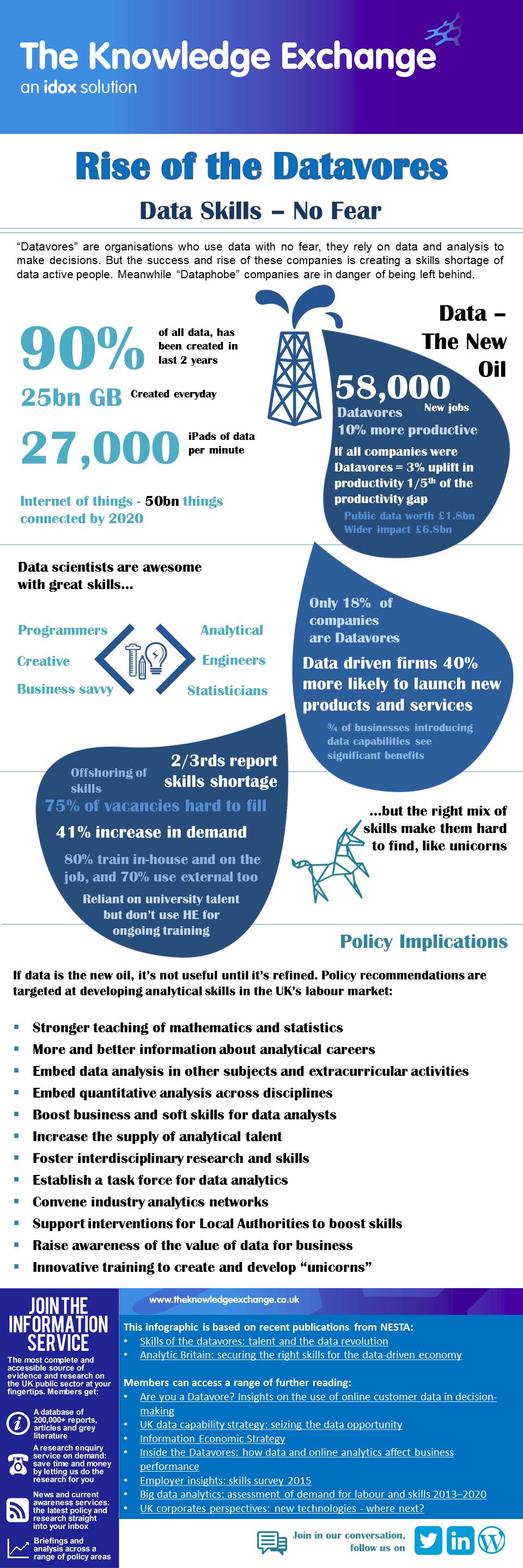 Previous work by NESTA highlighted companies with apparently no fear of data. They called them ‘datavores’. When making decisions about how to grow their sales, they rely on data and analysis over experience and intuition.
Previous work by NESTA highlighted companies with apparently no fear of data. They called them ‘datavores’. When making decisions about how to grow their sales, they rely on data and analysis over experience and intuition.
Does being data active have an impact?
According to a new NESTA report published this week Skills of the datavores: talent and the data revolution, those organisations which are more ‘data-active’ perform better than those that are not, as the infographic above illustrates:
- Datavores are 10% more productive
- But, only 18% of companies are datavores
- If all “dataphobes” became “datavores” it would add a 3% uplift in productivity
- Data-driven firms are 40% more likely to launch new products and services.
What does a skilled data workforce look like?
The research suggests that the biggest issue facing the industry is the lack of skilled data analysts/scientists, where demand has grown 41%. Businesses are using a combination of actions to solve this lack of supply of skilled people, including off-shoring the roles, recruiting best fit and using a combination of inhouse, on the job and external training to grow their own.
Many organisations are also developing inter-disciplinary teams to create a data literate workforce because the skills needed within a data scientist are so rare; as the report says, as rare as “unicorns”. Our own experience of recruiting a data scientist would support this.
The workforce which is emerging is one focussed on adaption and flexibility, based on data sciences across the board, such as qualitative researchers, mathematicians, statisticians, developers and business analysts. Within this mix of skills, the new workforce also needs to have a creative flair and business knowledge that enables them to use the data in the organisation’s best interest and to add value.
What does it mean for skills suppliers?
As an emerging profession, it is difficult to pin down the exact skills an employer needs which in turn makes it difficult for schools, colleges and universities to supply the right type of education. The accompanying policy briefing from NESTA and Universities UK, Analytic Britain: securing the right skills for the data-driven economy, makes a number of recommendations, highlighted in the infographic above, many of which focus on the skills suppliers.
Universities are both a supplier and user of these skills and have a unique opportunity to really enage with the market. The focus on metrics in both the proposed Teaching Excellence Framework and Research Excellence Framework means that universities themselves are in need of the same skills and have an opportunity to supply based on experience.
For universities these recommendations have a number of impacts, and data issues are increasingly at the forefront of policy thinking. Universities UK has reviewed how data analytics are taught across disciplines and reflects on the shortage of academic staff who are confident in teaching data analytics in this way and the varying skills of students entering higher education.
The pervasive nature of the data revolution explains why a variety of disciplines and skills are being brought together. No one can argue against the need for more and better data to improve policy making and business planning. Plenty of data is now being captured but not used, and in the words of John Lennon “you say you want a revolution” and “we all want to change the world” … data is changing our world significantly but are you equipped for it?
The Idox Information Service can help you access further information on the use of data science, and the skills needed. To find out more on how to become a member, contact us.
Download the Datavores Infographic.
Further reading on the topics covered in this blog and infographic*:
Skills of the datavores: talent and the data revolution
Are you a Datavore? Insights on the use of online customer data in decision-making
UK data capability strategy: seizing the data opportunity
Inside the Datavores: how data and online analytics affect business performance
Employer insights: skills survey 2015
Big data analytics: assessment of demand for labour and skills 2013–2020
UK corporate perspectives: new technologies – where next?
*Some resources may only be available to members of the Idox Information Service
Share
Related Posts
Supporting residents on the decarbonisation journey: leveraging data for effective retrofit projects
As the drive towards decarbonisation intensifies, the social housing sector’s ability to collect, store and manage vast amounts of data becomes increasingly critical. With a shared goal of creating warmer, carbon-free homes, housing associations’ strategic use of data is essential ....
A recent item on BBC Radio 4’s Today programme generated an unusually high number of responses from listeners. A man who had lost his job in the financial services sector at the age of 57 described his difficulty in trying ....
By Donna Gardiner While free school meals (FSM) have been available in England on a means-tested basis since 1944, recent years have seen a renewed focus upon the potential benefits of providing free school meals to all school-aged children. Currently, ....
Tackling geographical inequalities is critical for ensuring that all parts of the country have the potential to prosper. When the UK was a member of the European Union, it was entitled to a share of funding from the EU’s structural ....
